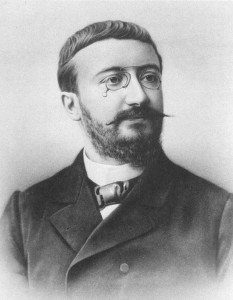
| Born: July 8, 1857 in Nice, France |
| Died: Oct 18, 1911 (at age 54) in Paris, France |
| Nationality: French |
| Fields: Psychology |
| Famous For: Binet-Simon intelligence scale |
Alfred Binet is renowned for his research related to the mental capacity of humans. Alfred transformed psychology, particularly in regard to intellect testing. Though he did not quite realize the real worth of his contributions to psychology before his death, he will be remembered for years to come because of those contributions.
Binet’s Early Life
Binet was born in 1857 in Nice, France. His mother was an artist and his father was a physician. Alfred was intended to follow in his father’s footsteps. As a young boy, Binet was not extraordinarily promising, though he showed a willingness to work. At 15, his parents divorced and he was brought up by his mother who moved with him to the city of Paris so that he could enroll into a popular law school there.
He attended Louis-le-Grand school and chose medicine and law as his favorite subjects. In 1878, Binet obtained a degree in law and decided to follow his family’s tradition of medicine. But Binet’s interest in psychology became more vital than completing his medical studies. He shifted his focus to psychology and started studying the works of John Stuart Mill, Charles Darwin, Symeon Vouteros and others.
Binet’s Career and Achievements
Alfred Binet started working at the Salpêtrière Hospital in Paris. He then went to the Laboratory of Experimental Psychology where he was an associate director and a researcher. He advanced to the lab’s director in 1894. Binet worked with two of his colleagues, Theodore Simon and Henry Heaunis, to build the psychology journal entitled L’Année psychologique.
His journal is considered to be among of the most imperative contributions in psychology. Victor Henri, a French physical chemist assisted him with the research of visual memory and the research regarding personal psychology.
The Binet-Simon Intelligence Scale
Binet stated that human intelligence and the individual dissimilarities in intelligence of more than a single person could be measured. The government of France requested him to develop the test to identify schoolchildren who have learning disabilities or who need special help in school. With the assistance of Theodore Simon, they developed numerous tests designed to measure mental abilities.
Instead of concentrating on learning information like mathematic and reading, he focused on other mental abilities like memory and attention. The scale Binet and his colleague developed became known as Binet-Simon Intelligence Scale.
In 1908, Binet and his assistant revised the scale, modifying, dropping, and adding the tests and organizing them based on age levels from 3 to 13. Binet published his third version of the Binet-Simon scale before he passed away in 1911, but it was incomplete. If it was not for his death, Binet would have kept on revising his scale. Today, the Binet-Simon scale is popular around the globe, mostly because it is simple to administer and quite brief.
Binet’s Legacy in Psychology
Today, Binet is cited among the most influential psychologists ever. Although his intelligence scale serves as a basis for contemporary intelligence tests, he did not believe that his test measured a permanent degree of intelligence. According to him, the score of a person may vary and he suggested that a few factors like motivation can play part in the test scores.